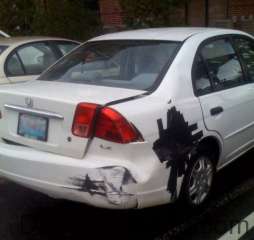A Non-Fatal Car Accident Could Cost You Your House

In an era of heavy litigation and astronomical medical costs, it’s important to realize just how much you could lose in the event of an automobile accident, fatal or not. Even non-lethal accidents could impose life-long costs on a teen driver or the driver’s parents.
Insurance May Not Cover Everything
Even if you have insurance, you may not be adequately protected. Given today’s medical costs, it’s not at all difficult for the costs of an auto accident to go beyond normal coverage limits. That’s especially true if there are several passengers involved.
Courts may also consider the cost of lost wages if someone in the accident is permanently or temporarily disabled. If the individual in question was particularly young or well compensated, those costs can be truly overwhelming. Again, the story gets worse if you’re dealing with multiple victims.
If you have the state mandated minimum liability coverage, you’ll almost definitely find that it’s not sufficient in the event of an accident. What may surprise you, though, is that even normal, high-quality comprehensive coverage can be inadequate.
What You Stand to Lose
If your teen is found to be at fault, the injured parties would have the opportunity to sue your insurance company to recover as much of those costs as possible. In the event that the insurance company doesn’t cover everything, suing you and your family would be the next logical step. If that happens, you could lose your home or possessions, along with a portion of your wages through garnishment.
The court may also choose to award significant punitive damages, particularly if the driver wasn’t fit for the roads in the first place. In cases where underage drivers had substance abuse issues, this is especially common. Hulk Hogan’s son was recently in an accident that left his friend severely injured. That single moment could prove expensive for the entire Hogan family.
In addition, you can also lose your insurance coverage. If you have multiple policies like life insurance or home owner’s insurance with the same company, they may choose to drop you from all of those policies. Once you’ve been dropped by a reputable company, it can be expensive, if not impossible to find another quality insurance provider to cover your needs.
What You Can Do
Obviously, the idea of losing so much is terrifying, but there are ways to minimize the risks. First, and most importantly, make sure that your teen gets the best driver’s education possible. Most authorities recommend a minimum of 6 months of intensive training, but more is always better. A new driver should get supervised practice in as many different situations as possible.
Second, you’ll want to make sure that you purchase as much insurance as you can possibly afford. The likelihood of having an accident in the first year of driving is extremely high, and while not all of those accidents will be serious, you should definitely prepare yourself for the worst. A bit of extra money now is definitely easier to swallow than a lifetime of payments towards a settlement.
Finally, consider the possibility that not every teen is ready to be let loose behind the wheel just because they celebrated a particular birthday. It’s difficult, but it may be appropriate to delay your teen from getting a license or impose significant restrictions on her driving privileges until she’s logged more practice hours. While many states are doing this with graduated licensing systems, parents should definitely use their own judgment about additional restrictions.
If you suspect that your teen is using drugs or alcohol, that’s an even bigger reason to avoid signing off on a driver’s license. Pairing inexperience with intoxication is practically asking for problems. Make sure that your teen gets help before getting a license.
It’s scary to think that a person’s actions at 16 could lead to a lifetime of financial problems, but that’s the reality of the situation. Before you allow your teen to drive, make sure that he or she is aware of these issues. If you’re a teen, remember this every time you feel tempted to veer away from the good driving habits you’ve been taught. Your actions have very real consequences.

